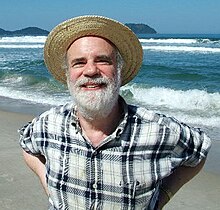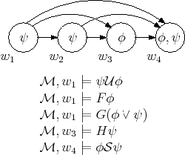Saul Aaron Kripke
Saul Aaron Kripke (born November 13, 1940 in Bay Shore , Long Island , New York ) is an American philosopher and logician . He wrote pioneering contributions to logic, especially in the field of modal logic , and to the philosophy of language , especially to name theory .

Life
Saul Kripke is the son of the author Dorothy K. Kripke and the rabbi and university teacher Myer Kripke. Already as a child he showed an amazing mathematical talent; by the age of six he had acquired a knowledge of Hebrew, and in fourth grade he had already read all of Shakespeare's dramas .
Kripke first studied mathematics at Harvard University , where he graduated with a bachelor's degree in 1962 . During his studies he received several prizes and awards. As early as 1958 - at the age of eighteen - Kripke published a work on modal logic under the title A Completeness Theorem in Modal Logic in The Journal of Symbolic Logic . A few years later, further fundamental research on modal logic followed, including Semantical Considerations in Modal Logic (1963) and Semantical Analysis of Modal Logic (1963/65).
From 1964 to 1966 he taught at Princeton University and from 1966 to 1968 at Harvard University. He was then appointed to Rockefeller University in New York , where he taught philosophy until 1976. In 1977, Kripke took over the McCosh Professorship in Philosophy at Princeton University until his retirement in 1997. In 1978 he was admitted to the American Academy of Arts and Sciences and in 2004 to the American Philosophical Society . Kripke is a philosophy professor at the CUNY Graduate Center .
Kripke is currently a member of the City of New York Graduate Center . In 2001 he was awarded the renowned Schock Prize for Logic and Philosophy.
Kripke has held more than a dozen renowned visiting professorships and a far larger number of “Distinguished Lectureships”, including at Oxford, London, Berkeley, Los Angeles, Princeton, Cornell, California Institute of Technology, Wisconsin, Uppsala and Tel Aviv Universities. He received honorary doctorates from the University of Nebraska , Johns Hopkins University and the University of Haifa .
plant
Modal logic
Kripke made a decisive contribution to the semantic clarification of modal logic and fundamentally influenced modern modal logic with his theoretical model investigations. He introduced the concept of a (normal) model structure. A model structure is an ordered triple (G, K, R), where K is a (non-empty) set, R is a reflexive relationship over K and G is an element of K. From an intuitive point of view, K is the set of all possible worlds , G the real world, while R is determined as a relative possibility. If one has such a model structure, a model assigns each atomic formula P a truth value true (W) or false (F) in each world H belonging to the set K.
Name theory
In 1972 Kripke published a widely acclaimed study on the semantics of proper names , which appeared in an expanded book in 1980 under the title Naming and Necessity . According to Frege and Russell, proper names are abbreviated descriptions; Descriptions have meaning and meaning. On the other hand, Kripke puts forward the thesis that a proper name has only one meaning ( reference ). Only in this way can he designate one and the same object in all possible worlds. Trade names are " rigid designation expressions " ( rigid designators ). The name is given to the object to be named in an act of baptism and then passed on in a "chain of communication".
The application of this theory to the designation of natural kinds ( natural kinds ) leads Kripke to the conviction that natural kinds necessarily have certain properties. Statements that represent scientific discoveries about what a particular species is are not contingent, but rather necessary truths in the strictest sense.
Contrary to the traditional view that truths are only given as a priori truths, Kripke explains that there are also contingent truths a priori (eg: "The original meter is 1 m long") and necessary truths a posteriori (eg: "Augustus is identical to Octavian") there. For him, “a priori” and “a posteriori” are epistemological terms that we use to ask how we can recognize the truth of a particular statement. In contrast, “necessary” and “contingent” are ontological terms with which we ask whether the world in this respect could also have been different from what it actually is.
Rules and private language
In 1982, Kripke presented Wittgenstein on Rules and Private Language, a much discussed interpretation of Ludwig Wittgenstein's work, the accuracy of which is controversial, but which has a major influence on the further discussion of Wittgenstein's philosophy. This specific further development of Wittgenstein's positions is often referred to in analytical philosophy with the play on words "Kripkenstein". In his book, Kripke supports the thesis that Wittgenstein's argument against the possibility of private language must be explained primarily from the point of view of “following the rules ”. For Kripke, the key point against the possibility of a private language is the remark made by Wittgenstein in § 201 of the Philosophical Investigations , "a rule could not determine a course of action, since every course of action should be brought into conformity with the rule". According to Kripke, this paradox establishes a new form of philosophical skepticism .
Other contributions
He is also known for his contribution to the development of formal theories to circumvent the liar paradox .
Kripke has published only a few papers since the late 1980s. A new article by Kripke ( Russell's Notion of Scope ) was published in a special issue of Mind magazine (October 2005) , which - like other texts by Kripke - is based on a tape recording of a lecture. He rejects a strictly naturalistic worldview and materialism .
Awards
- 2001: Schock Prize for Logic and Philosophy
Publication (selection)
- Identity and Necessity . In: MK Munitz (Ed.): Identity and Individuation . New York 1971
-
Naming and Necessity . In: Gilbert Harman u. Donald Davidson (Ed.): Semantics of Natural Language . Reidel, Dordrecht, Boston 1972
- Naming and Necessity . Blackwell, Oxford 1980 ISBN 0-631-12801-8
- German edition: Name and Necessity. Translated by Ursula Wolf . Suhrkamp, Frankfurt am Main 1981 (paperback edition 1993 ISBN 3-518-28656-0 )
-
Wittgenstein on Rules and Private Language. An Elementary Exposition. Harvard University Press, Cambridge [Ma.] 1982 ISBN 0-674-95401-7
- German edition: Wittgenstein on rules and private language. An elementary representation . Suhrkamp, Frankfurt 1987 ISBN 3-518-29383-4
- Unrestricted Exportation and Some Morals for the Philosophy of Language , Collected Papers Vol. I, Oxford University Press. Podcast (MP3; 33.8 MB) of the associated City University of New York LECTURE SERIES recording from June 30, 2008
-
Reference and Existence. The John Locke Lectures . Oxford University Press, Oxford etc. 2013 ISBN 978-0-19-992838-5
- German edition: Reference and Existence. The John Locke Lectures . Translated from English by Uwe Voigt . Reclam, Stuttgart 2014 ISBN 978-3-15-010966-3
- Articles from "Philosophical Troubles" . Translated from American English and edited by Uwe Voigt. Reclam, Stuttgart 2017 ISBN 978-3-15-019181-1
literature
- Jonathan Berg (Ed.): Naming, Necessity and More: Explorations in the Philosophical Work of Saul Kripke . Palgrave Macmillan 2014, ISBN 978-1-137-40092-5
- John P. Burgess: Saul Kripke. Puzzles and Mysteries . Polity Press 2013, ISBN 978-0-7456-5284-9
- Harold Noonan: The Routledge philosophy guidebook to Kripke and Naming and necessity , London [u. a.]: Routledge, 2013, ISBN 978-0-415-43622-9
- Alan Berger: Saul Kripke . Cambridge University Press 2011, ISBN 978-0-521-85826-7
- Christopher Hughes: Kripke. Names, Necessity, and Identity . Oxford University Press 2004, ISBN 978-0-19-824107-2
- Jesús Padilla Gálvez : Reference and theory of the possible worlds. Presentation and criticism of the logical semantic theory in the philosophy of language analysis . Peter Lang, Frankfurt a. M., 1989, ISBN 3-631-40780-7
- Matthias Schirn: Saul A. Kripke . In: Julian Nida-Rümelin (ed.): Philosophy of the Present in Individual Representations. From Adorno to v. Wright (= Kröner's pocket edition . Volume 423). Kröner, Stuttgart 1991, ISBN 3-520-42301-4 , pp. 288-297.
- Wolfgang Stegmüller : Kripke's interpretation of Wittgenstein's late philosophy. Attempted to comment on an attempted comment . Kröner, Stuttgart 1986, ISBN 3-520-66101-2
Web links
- Literature by and about Saul Aaron Kripke in the catalog of the German National Library
- Saul Kripke Center. The Graduate Center, accessed February 21, 2011 .
- Andreas Saugstad: Saul Kripke, Genius Logician. Go Inside Magazine, accessed February 21, 2011 .
Individual evidence
- ^ Mitchell S. Green: Kripke, Saul Aaron (1940-). In: John R. Shook (Ed.): The Dictionary of Modern American Philosophers . Thoemmes Continuum 2005, pp. 1360-1367
- ^ Matthias Schirn: Saul A. Kripke . In: Julian Nida-Rümelin (Ed.): Philosophy of the Present . Kröner, Stuttgart 1991, p. 288.
- ^ Member History: Saul A. Kripke. American Philosophical Society, accessed January 3, 2019 (with biographical information).
- ↑ Cf. Matthias Schirn: Saul A. Kripke . In: Julian Nida-Rümelin (Ed.): Philosophy of the Present . Kröner, Stuttgart 1991, p. 289.
- ↑ Kripke himself admitted that he did not want to present Wittgenstein's argument or his own, but rather a significant philosophical argument, how it affected him, cf. A. Rami: "Wittgenstein's Paradox of Understanding", 56 (2002) ZfphilF , p. 2.
- ↑ Xin Sheen Liu: "Kripkenstein: Rule and Indeterminacy" , Paideia Archive.
- ^ Andreas Saugstad: Saul Kripke: Genius logician . Go Inside Magazine of February 25, 2001 (see web link).
| personal data | |
|---|---|
| SURNAME | Kripke, Saul Aaron |
| BRIEF DESCRIPTION | American philosopher and logician |
| DATE OF BIRTH | November 13, 1940 |
| PLACE OF BIRTH | Bay Shore , Long Island , New York |
